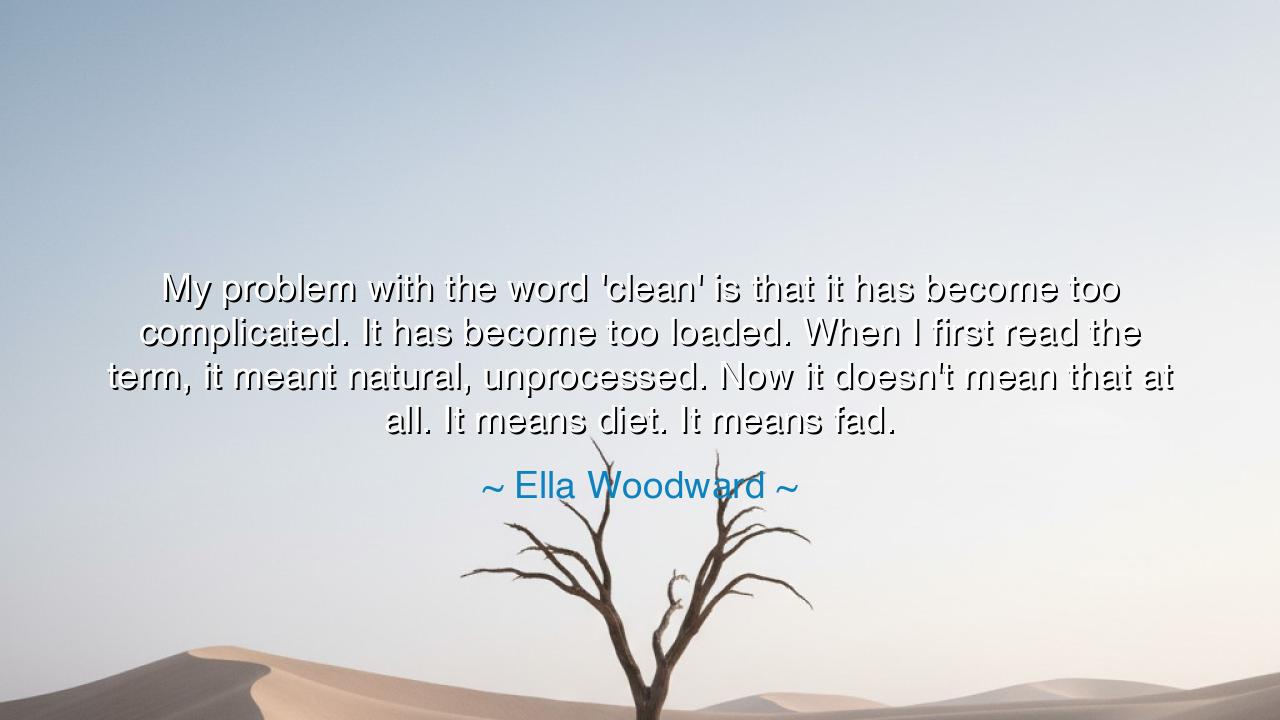
My problem with the word 'clean' is that it has become too
My problem with the word 'clean' is that it has become too complicated. It has become too loaded. When I first read the term, it meant natural, unprocessed. Now it doesn't mean that at all. It means diet. It means fad.






In the sacred wisdom of the ancients, where simplicity and purity were held in the highest esteem, the words of Ella Woodward resonate with a truth that transcends time. "My problem with the word 'clean' is that it has become too complicated. It has become too loaded. When I first read the term, it meant natural, unprocessed. Now it doesn’t mean that at all. It means diet. It means fad." In these words, Ella Woodward speaks to the confusion of our age—a time where simplicity has been overshadowed by trends and complexities, where the very language of health has been corrupted by passing fads and market-driven ideals. Her words are a call to return to the ancient truth that health is not found in the latest diet or the next big trend, but in the purity of nature itself.
In the age of the ancients, the Greeks understood that true nourishment came from the land—unprocessed, natural food that sustained both the body and spirit. Hippocrates, the father of medicine, believed that healing came from the earth itself. He once said, "Let food be thy medicine and medicine be thy food." To him, the word clean had a simple, pure meaning: it was food in its most natural state, untouched by the complexities of human intervention. The idea of a diet or a fad was foreign to the ancients, for they understood that health was not a trend to be followed, but a way of life to be honored. Ella Woodward's lament about the word clean speaks to this loss of purity in our modern understanding of health.
The ancient Romans, too, revered the simplicity of natural foods. The great Cato the Elder, in his writings, advocated for unadulterated food that was grown in the soil, free from the interference of overcomplicated preparations. He understood that true strength lay in nourishing the body with simple, whole foods, rather than falling prey to the allure of artificial concoctions. Ella Woodward speaks to the modern distortion of the word clean—how what was once understood as natural, unprocessed food is now mired in confusion, surrounded by the noise of fad diets and trendy labels. The simplicity of ancient wisdom has been lost in the frenzy of modern consumerism, where the pure and natural has been replaced by complicated, artificial constructs.
In the stories of old, we find heroes who, in their pursuit of greatness, did not rely on complex regimens or fashionable foods but on the nourishment of the land. The Spartans, revered for their strength and discipline, ate simple, hearty meals that supported their physical prowess. Their diet, though modest, was based on the principle of whole, natural foods—foods that gave them the energy to endure the harshest of trials. They did not need the latest diet trend to fuel their greatness; they simply ate what was real, what was from the earth, and what would sustain them. In this, we see the ancient understanding that health is not a commodity to be bought and sold, but a state of being that comes from living in harmony with nature. Ella Woodward’s frustration with the commercialization of the word clean echoes the loss of this ancient wisdom.
As Ella Woodward rightly points out, the word clean has been twisted in the modern world. What was once a simple truth—natural, unprocessed food that sustains life—is now laden with the weight of fad diets and the complex language of the marketplace. The ancient philosophers knew that true health did not lie in the trends or in the complex rules of the latest diet, but in the simple, pure choices that we make daily. The Stoics, particularly Marcus Aurelius, taught that we must live in accordance with nature, avoiding the distractions of external desires. For them, health was not a commodity, but a result of living in balance with the natural world—a life lived simply, without the need for elaborate schemes or artificial constructs.
The lesson to be learned from Ella Woodward is a call to return to the simplicity of the ancient ways—a reminder that health does not come from the latest trend or from complicated systems of nourishment. True well-being comes from purity, from eating foods that are closest to their natural state, unprocessed, and free from the weight of modern complexity. In a world where the word clean has become a marketing term, we must remember that it is not the labels that matter, but the truth of the food we eat. We are meant to nourish our bodies with what is pure, simple, and real.
So, let us heed Ella Woodward’s words and return to the simplicity of the ancients. Let us seek to nourish ourselves with unprocessed, natural foods, free from the distractions of the modern world’s fads and trends. Let us remember that health is not a commodity to be bought, but a way of life—a life that honors the body’s connection to the earth. As the ancients did, let us live simply, choosing foods that sustain and nurture, living in harmony with nature, and in doing so, we shall restore the purity that has been lost in the modern world. Health, after all, is not found in complexity, but in the simplicity of truth.






AAdministratorAdministrator
Welcome, honored guests. Please leave a comment, we will respond soon